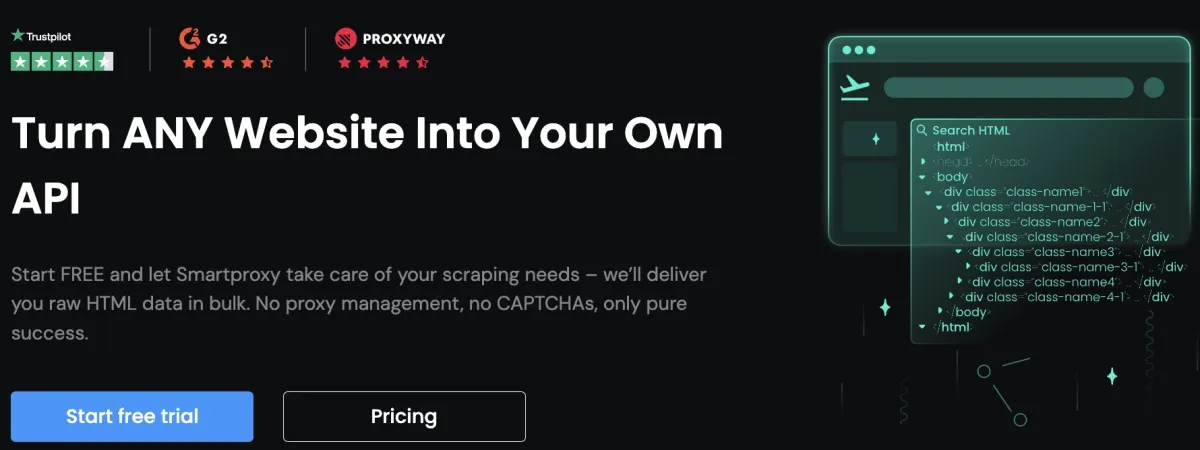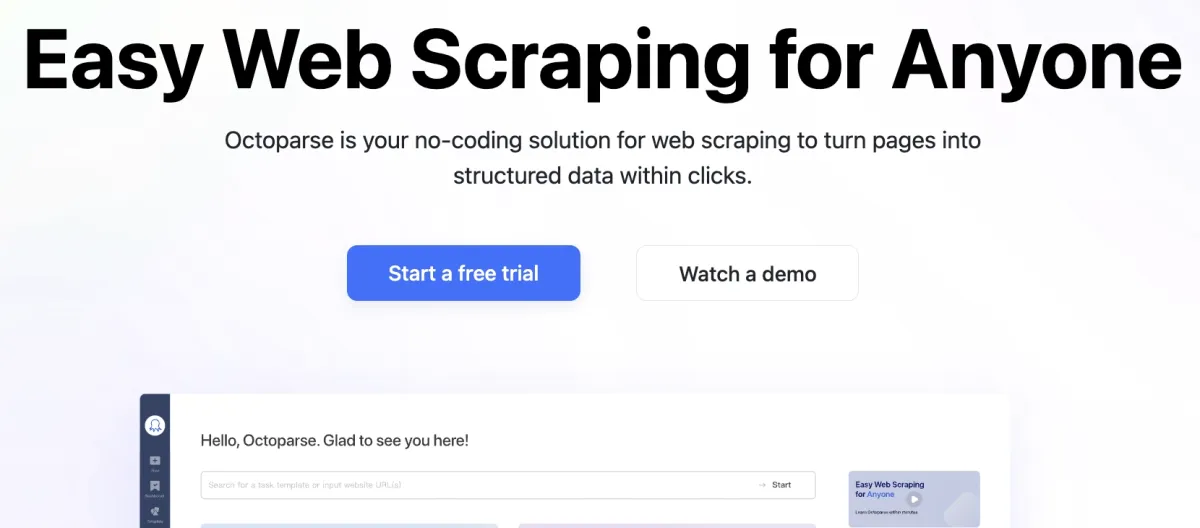One rich source of business data is the Yellow Pages, offering a comprehensive directory of businesses and services. However, extracting this data can be a daunting task without the right tools. Yellow Pages scrapers simplify this by automating the data collection process, making large scale web scraping of business information efficient.
In this guide, we will dive into the realm of Yellow Pages scraping. Our focus will be on examining the best Yellow Pages scrapers currently available, highlighting their main features, and evaluating their pricing models.
Top 6 yellow pages scrapers: An analysis focused on pricing
| Vendors | Starting price/mo | Free trial | PAYG plan |
|---|---|---|---|
| Bright Data | $500 | 7-day | ✅ |
| Oxylabs | $49 | 7-day | ❌ |
| Smartproxy | $29 | 14-day money-back | ❌ |
| Nimble | $150 | 7-day | ❌ |
| Octoparse | $75 | 14-day | ❌ |
| Scrape-It.Cloud | $29 | 30-day | ❌ |
What is a yellow page scraper?
A yellow page scraper is a type of tool specifically designed to extract data from yellow pages, including businesses and their contact details like business name, phone numbers and business email.
Instead of manually copying and pasting business data, a web scraper automatically navigates through the yellow pages and collect the necessary data from these directories. The scraped data delivered in a structured format like CSV, Excel, or a database.
What is a yellow page?
Yellow pages are telephone directories for businesses and organizations. They include names, contact information and business addresses. This information was printed for advertisement purposes on yellow-coloured pages.
Today, yellow pages have become a commonly used term for any telephone directory for commercial use in many countries. Since the printing of yellow pages has ceased, these directories are now available on the internet. They have some added features of reviews, discussion boards and website/social media links. “yellowpages.xx” exists in 75 countries now. Some of the yellow pages online are:
- https://www.yellowpages.ca/ for Canada
- https://www.yellowpagesdirectory.com/ for USA
- https://yellowpageseu.net/ for Europe
- https://www.yellowpages.com.au/ for Australia
How to scrape data from yellow pages
- Examine the structure of yellow pages: To get familiar with the layout of yellow pages website, you need to understand where the data you need is located on the page. Examine how business details are formatted such as in tables or paragraphs. Understand how the website handles with multiple pages (pagination format) like infinite scrolling or next buttons. Check how the URL changes when you move between these pages.
- Choose your library or scraper: You can utilize an off-the-shelf web scrapers (including low/no code web scrapers) or web scraping library. Common Python-based choices include BeautifulSoup, Scrapy, and Selenium.
- BeautifulSoup: Ideal for small-scale tasks. It provides a simple method to navigate and parse HTML content (static pages). It is not well-suited for dynamic websites which rely on JavaScript.
- Scrapy: Ideal for large-scale data collection projects, allowing users to handle requests asynchronously. However, it has a steeper learning curve than BeautifulSoup.
- Selenium: Ideal for scraping dynamic content. It can simulate real user interactions like clicks and scrolls. It is might be slower compared to other tools.
- Follow pagination links: To effectively navigate through multiple pages and extract data from every page of a listing, you need to observe how the website implements pagination like numbered pages, infinite scrolling, or next button. For example, you can locate the button’s selector using Selenium for next button pagination.
Choosing the right yellow pages scraper
1. Bright Data
Bright Data, a leading platform in web data collection, provides an extensive array of web scraping solutions. This includes specialized web scrapers, a variety of proxy services, and pre-compiled datasets that are ready for use.
They offer a Yellow Pages scraper that enables users to scrape thousands of pages from Yellow Pages directories, facilitating comprehensive data collection from these extensive business listings.
Bright Data free trial includes access to predefined JavaScript functions and allows the publication of up to three scrapers, each capable of extracting a maximum of 100 records.

Features:
- Browser scripting in JavaScript: Allows users to optimize their browser control and data parsing tasks. You can automate interactions with a web browsers, including web page navigation and manipulating web page content.
- Built-in proxy and unblocking: Offers integrated proxy solutions and web unblocker technology, helping to avoid IP bans and overcome other anti-scraping measures like CAPTHAs.
- Auto-scaling infrastructure: Dynamically adjust its resources when the scraping demand increases, making it suitable for large-scale data collection projects.
- Auto-retry mechanism: Automatically attempt a failed request again.
- Data export format: JSON, NDJSON, CSV, or Microsoft Excel.
2. Oxylabs
Oxylabs stands as a leading figure in the web scraping sector, providing web scraping APIs and proxy services. This provider delivers an API solution specifically designed for scraping Yellow Pages, and they offer of 5,000 free results over a one-week period.

Features:
- Built-in proxies: Offers 4 types of proxy server integrated the yellow pages scraper API.
- Country-level targeting: You can filter data based on the country extract localized business data from yellow pages directories.
- Data export format: HTML
3. Smartproxy
Smartproxy emerges as one of the most promising vendors, delivering a range of specialized scrapers, including user-friendly no-code solutions and APIs, complemented by their proxy services.
They offer advanced features comparable to those of Bright Data and Oxylabs, but at more competitive pricing. This approach ensures that users with smaller-scale requirements can access high-quality options without exceeding their budget constraints. Smartproxy offers one-month free trial with 3,000 requests.

Features:
- JavaScript rendering: Fetch data on-demand and collect data from static and dynamic websites.
- Data storage in the cloud: Allows you to store the scraped data on the cloud.
- Proxy-like integration: The API serves as a middleman, with requests being routed through the API itself.
- Data export format: HTML
4. Nimble
Nimble provides a comprehensive 3-in-1 scraping API which includes a residential proxy pool, and a proxy unblocker capable of handling JavaScript rendering and browser fingerprinting. The Web Scraping API offers features like page interactions and parsing templates, encompassing functionalities such as clicking, typing, and scrolling.

Features:
- Rotating residential proxies: Connection requests are directed through a provided proxy network, with each request being assigned a unique IP address.
- Sticky sessions: Should you need a stable IP address for longer durations, you have the option to start a sticky session. The IP address remains unchanged unless there’s inactivity for 10 minutes, after which it switches.
- Bulk scraping: Allows users to handle a large volume of URLs in a single request, offering the capacity to process as many as 1,000 URLs at the same time.
- Data export format: HTML or JSON
5. Octoparse
Octoparse provides a cloud-based storage and management platform for data, tailored for users without programming skills.

Features:
- Cloud data extraction: Offers both on-premise (local) and cloud-based solutions for data scraping. With on-premise data extraction, users can scrape data using their personal devices. Alternatively, cloud-based data extraction involves the storage and processing of data on remote cloud servers.
- Proxy Support: Offers rotating HTTP proxies as part of its feature set. When operating in Cloud Extraction mode, Octoparse utilizes third-party proxies to automatically rotate IP addresses.
- Data Cleaning: Features integrated Regex (Regular Expression) and XPath tools within its system for the automated cleaning and structuring of the extracted data.
- Data export format: Excel, HTML, TXT and CSV file
6. Scrape-It.Cloud
Scrape-It.Cloud offers both web scraping APIs and no-code web scrapers, designed to enable users to efficiently extract valuable business information from Yellow Pages. They provide a monthly allowance of 1,000 free API credits.

Features:
- Parallel data extraction: Helps users run multiple data extraction tasks at the same time, making it suitable for scraping large volumes of data.
- Automatic scaling: Automatically increases or decreases the number of active scraping bots.
- Automatic proxy rotation: Each request is sent through a different proxy IP from the pool.
- Data export format: HTML, JSON, or CSV file
How can web scraping help?
Web scraping is beneficial for all e-commerce activities. Web scraping can be done manually, or the process can be automated using a bot or a web crawler. Some ways in which web scraping can help you with yellow pages are:
Engaging with customers
- Since yellow pages have the option for customers to leave reviews, you can use those to make improvements in your services or products with sentiment analysis.
- You can also use reviews on other businesses to look out for competitors and the type of service they are offering.
- Scraping data from discussion boards can help you see which services are in high demands so you can make the necessary changes.
Getting data on prices
- Scraping pricing data can help you find a range of prices for your services in the market.
- You can identify any changes in prices from your competitors and respond timely to not lose out customers.
- Getting information on any deals and discounts can help you prepare better marketing strategies to always stand out from the crowd with the best prices.
Find connections
- Apart from checking on competitors and having a successful marketing strategy, yellow pages can also help in finding connections.
- You can find providers to choose from for any services or products you may need for your organization.
- Often expert networks need people from different occupations for research purposes and scraping yellow pages can be helpful in finding those connections.
- Academicians and researchers can also find a variety of businesses and workers to connect to for their studies.
Is yellow page scraping legal?
The legality of scraping data from yellow pages varies based on several considerations. In the European Union, for example, the General Data Protection Regulation (GDPR) strictly regulates the collection and usage of personal data.
Moreover, many websites, such as online yellow pages, typically include clauses in their terms of service that forbid automated data scraping. Before conducting any scraping activities, it’s crucial to thoroughly examine the terms of service of the target website.
Another significant aspect is the purpose for which the scraped data is used, particularly if it contains personal details. For example, utilizing this data for unsolicited marketing purposes might result in legal complications.
Why are yellow pages important today?
Yellow pages provide easy access to a variety of services/businesses which may not all show up in your Google search. Search engines report results based on relevance to the search term, whereas online yellow pages show results based on geographic areas.
You can find more local and regional businesses if you use yellow pages instead of the mainstream search engines. If you are looking to get a better local reach for your business, it can be useful to advertise in online yellow pages for your region.
If you want to know more about web scraping, feel free to contact us.

![Proxies for Web Scraping: Providers & Best Practices [2025]](https://research.aimultiple.com/wp-content/uploads/2021/04/proxy-scraping-1-190x143.png.webp)
Comments
Your email address will not be published. All fields are required.